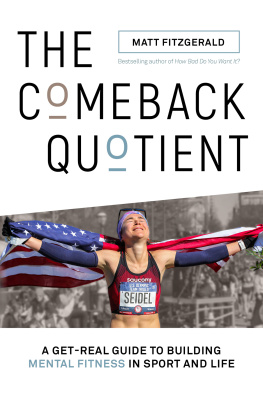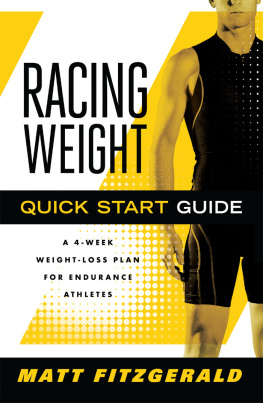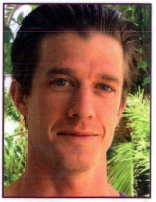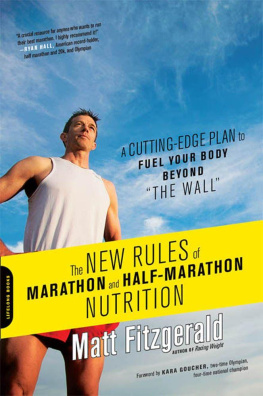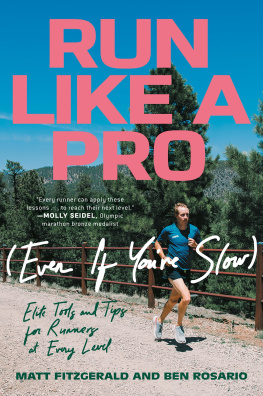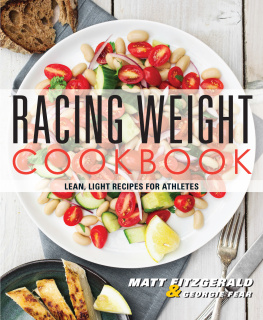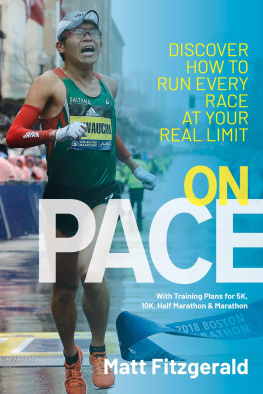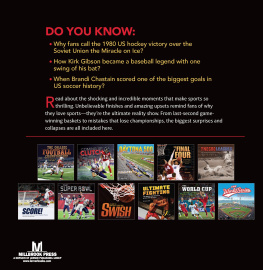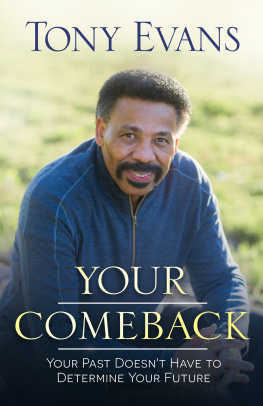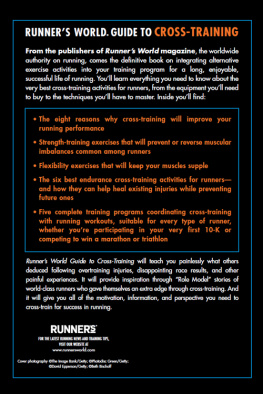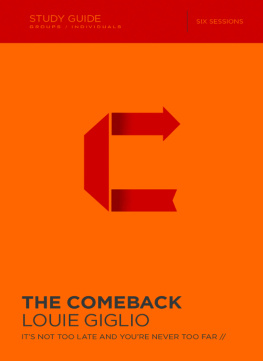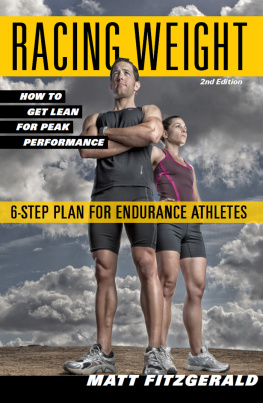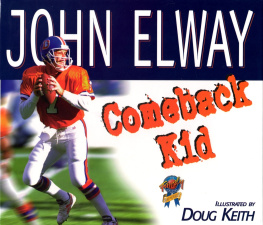Contents
Guide

Copyright 2020 by Matt Fitzgerald
All rights reserved. Published in the United States of America.
Ironman is a registered trademark of World Triathlon Corporation.

5720 Flatiron Parkway
Boulder, CO 80301 USA
VeloPress is the leading publisher of books on endurance sports and is a division of Pocket Outdoor Media. Focused on cycling, triathlon, running, swimming, and nutrition/diet, VeloPress books help athletes achieve their goals of going faster and farther. Preview books and contact us at velopress.com.
Distributed by Ingram Publisher Services
The Library of Congress has cataloged the printed edition as follows:
Names: Fitzgerald, Matt, author.
Title: The comeback quotient: a get-real guide to building mental fitness in sport and life / Matt Fitzgerald.
Description: Boulder, Colorado: VeloPress, [2020] | Includes bibliographical references and index.
Identifiers: LCCN 2020032189 (print) | LCCN 2020032190 (ebook) | ISBN 9781948007160 (paperback) | ISBN 978-1-948006-26-2 (ebook)
Subjects: LCSH: AthletesPsychology. | SportsPsychological aspects. | Comebacks.
Classification: LCC GV706.4.F52 2020 (print) | LCC GV706.4 (ebook) | DDC 796.01dc23
LC record available at https://lccn.loc.gov/2020032189
LC ebook record available at https://lccn.loc.gov/2020032190
Art direction and interior design by Vicki Hopewell
Cover design by Kevin Roberson
Front cover photo by Kevin Morris
Back cover and p. 213 photo by Tom Hood
v. 3.1
A note to readers: Double-tap on illustrations to enlarge them. After art is selected, you may expand or pinch your fingers to zoom in and out.
For Cory
Everything that happens is either endurable or not.
If its endurable, then endure it. Stop complaining.
MARCUS AURELIUS
CONTENTS
On a muggy Thursday evening in September 1993, Rodney Flowers suffered a catastrophic spinal injury while playing JV football for the Pirates of Lumberton, North Carolina. In the blink of an eye, the 15-year-old aspiring pro baller went from star athlete to paraplegic. Doctors told him he would probably never walk again, but today, nearly three decades later, Rodney is not only walking but a successful resilience trainer, author, public speaker, and podcasterand he credits his mind, above all, for having gotten him from where he was to where he is.
I was nearly done writing this book, with only a short preface left to nail down, when I received an unexpected invitation to be a guest on Rodneys Game Changer Mentality podcast. It was also a timely invitation, for the not-quite-finished book I set aside to chat with Rodney was all about comebacks, particularly in the realm of sports, a topic Rodney knows a thing or two about.
Game Changer was more than just an opportunity for me to speak to an expert about a top-of-mind topic. It served also as a helpful reminder that the highest purpose of sport is not to determine winners and losers but rather to train the mind for successa success that goes well beyond sport. After all, though Rodney did regain the ability to walk, his days as an athlete were over the moment his neck snapped on the gridiron on that fateful late-summer night. Yet it is the athlete inside him that has brought him so far. The same determined mindset that ensured Rodney, rather than any of his teammates, made the flying tackle on the South View Tigers kick returner that landed him in a wheelchair was what got him out of that wheelchair eventually. I developed the attitude that whatever it [took] to regain my strength and ability would be exactly what I would dig down and give to the challenge ahead, he writes in his memoir, Get Up!
I am hardly alone in believing that the psychology of success in athletics is also the psychology of success in life writ large. Increasingly, psychologists and brain scientists are focusing their research on sport out of a recognition that it has much to teach us about the human mind and behavior. In a 2016 essay titled Is Sport the Brains Biggest Challenge? Vincent Walsh of the Institute of Cognitive Neuroscience at University College London asked, What makes the best the best? There is an opportunity here to treat... elite athletes as case studies from which we can make useful generalizations, much as we have for over a century with neuropsychological single-patient case studies. By studying the abnormal (the elite), we may learn about the population.
The timing of my interview with Rodney was apposite in another way. We spoke at the height of both the COVID-19 pandemic in the US and the social unrest that followed the murder of George Floyd, an unarmed Black man, by a Minneapolis police officer. Eight out of 10 Americans had recently said they believed the country was out of control in a nationwide survey. An entire societyindeed, almost the entire worldhad been knocked down by the year 2020, and would need to make a comeback of one kind or another.
When I started working on The Comeback Quotient in the later part of 2018, I couldnt have imagined what was around the corner. As it turned out, I was affected personally by both of the aforementioned crises, being the husband of an African American woman and coming home from the 2020 Atlanta Marathon infected with virus du jour, which knocked me flat for an entire month. Yet despite the suffering I shared with so many, I couldnt help feeling that, in a small way, these events justified the huge investment of time and energy Id made in the book while also bringing clarity to the project. In particular, the coronavirusGeorge Floyd double whammy underscored my belief that setbacks are inescapable in life, hence that all of us need to possess the ability to pull off a comeback.
Some people will come back from 2020 more successfully than others, and a special few will not only survive but thrive, ultimately emerging better than ever, and in so doing they will achieve something that amazes those around them. The most important revelation I had in writing this book was the discovery that, beneath superficial differences in their individual stories, the special few who prove themselves capable of achieving amazing comebacks are all doing the same thing, going through the same process to get up (to borrow Rodneys phrase) and get moving again, better than before. And although I made this discovery within the athletic realm, it applies elsewhere. Most of the remarkable men and women featured in these pages are athletes, but in many cases the defeats and challenges they came back from occurred outside the sporting context, and their comebacks themselves transcend sport.
My greatest hopes for this book are (1) that it is read by athletes and nonathletes alike and (2) that every reader is able to apply the inspiration and learning they glean from it to their own life, whether it be in a sport, a relationship, a job, a health crisis, or any other circumstance where a comeback is called for. If you happen to be an athlete, the stories I share here will have a special resonance. And if you arent, then I encourage you to read The Comeback Quotient as one long metaphor (life as marathon, if you will), the same way businesspeople read Sun Tzus The Art of War or Machiavellis

